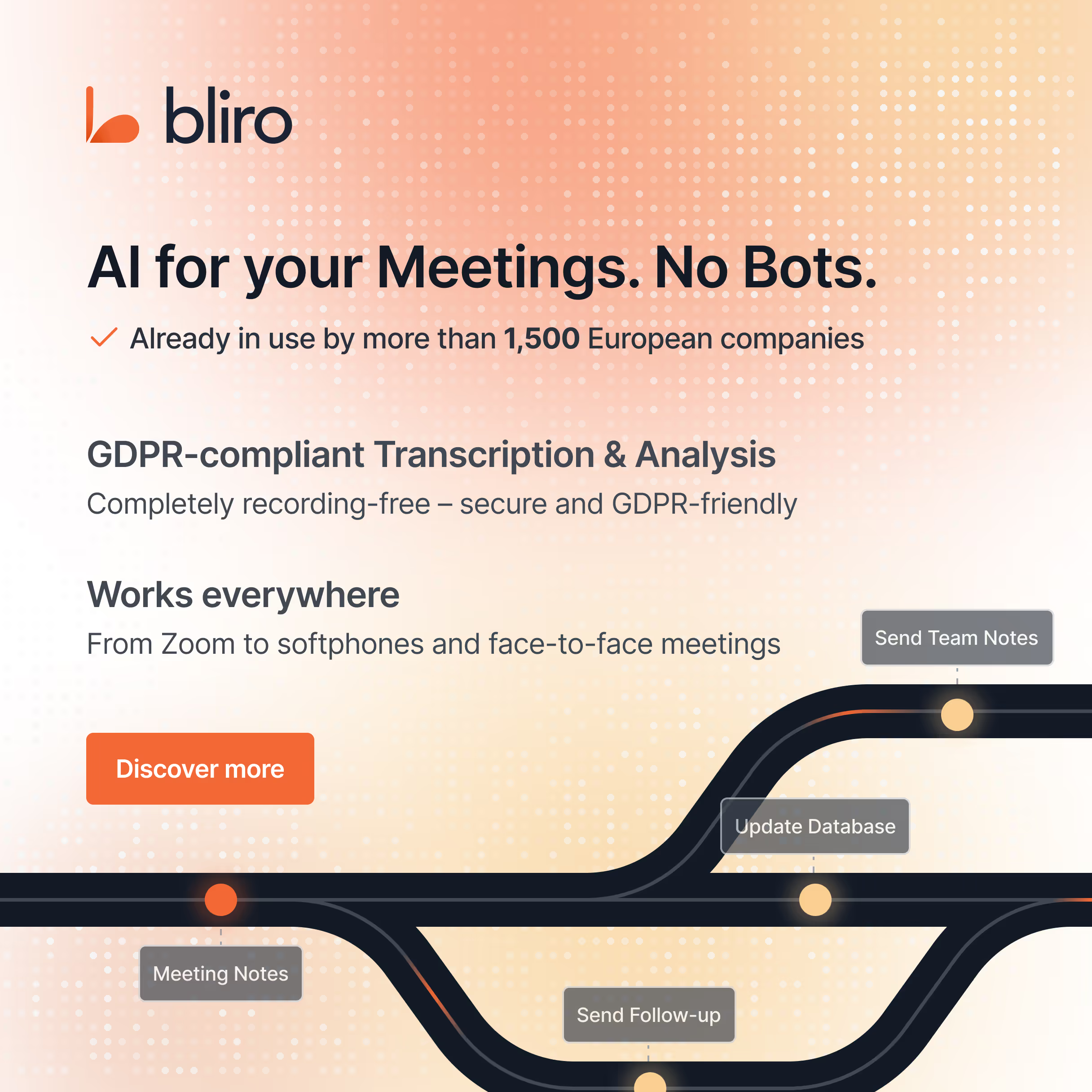AI in SMEs offers enormous potential - but we are not yet fully exploiting this potential. According to a McKinsey study, sales teams can achieve up to 40% productivity gains through the use of AI - primarily through automation and prioritization. In fact, a study commissioned by the Federal Ministry of Economics and Climate Protection shows that 52% of the small and medium-sized companies examined are still in the experimental phase with AI applications.
While sales teams spend an average of just 28% of their time actually selling and the rest is spent on administrative tasks, data maintenance or searching for information, the use of AI in companies offers significant opportunities. AI can streamline sales processes, facilitate prioritization and automate communication processes. It can also help to reduce costs and increase efficiency - particularly important in light of rising costs for materials and services. In this article, we will show you specific practical examples and best practices of how medium-sized companies can profitably use AI in sales.
Why AI is now crucial in B2B sales for SMEs

German SMEs are under enormous pressure today. The fast-paced technological advancements and constantly changing customer needs place gigantic demands on the market and competitiveness of companies. To survive in this global competition, companies must become more efficient - particularly in Sales. But which factors make the use of AI in B2B sales by SMEs so decisive today?
Growing demands on sales teams
Progressive digitization is increasingly shaping B2B sales. Automated processes, AI-powered tools and data-driven decisions are increasingly becoming an integral part of more successful sales strategies. At the same time, the tension between customer uncertainty and production requirements is growing. Sales teams must provide precise and reliable long-term forecasts, while customers often only plan at short notice. In addition, B2B buyers today expect digital services - according to studies, they already 83% of B2B buyers want self-service portals.
Shortage of skilled workers and time pressure
An ever increasing problem for medium-sized companies is shortage of skilled workers in sales. Especially for companies with more than 50 employees and an annual turnover of over 2 million euros, it is becoming increasingly difficult to obtain qualified salespeople to find. There were just under 500,000 open sales outlets in the third quarter of 2022 alone - that is 93,000 more vacancies than in the same period of the previous year. On average, salespeople only spend 59% of their working day with the actual sale. The biggest time waster? The way customer data and interactions are managed
AI as an answer to increasing complexity
In view of these challenges, more and more medium-sized companies are focusing on artificial intelligence. Actually 75% of companies say that AI is currently influencing corporate strategy. The majority of companies (52%) plans to work more efficient with the help of AI. AI can automate repetitive tasks and thus relieve sales teams. Thanks to advanced algorithms and machine learning techniques, AI can analyze huge amounts of data precisely and efficiently. However, many companies are still at the beginning: 31% of SMEs do not have enough AI specialists, and 29% see challenges in implementing AI into business processes.
7 practical examples of AI in sales automation
Modern AI solutions offer medium-sized companies numerous opportunities to make sales more efficient. Here are seven specific application examples that are already being used successfully today by SMEs:
1. Lead scoring and prioritization
AI systems analyze the behavior of potential customers on your website, in emails, or social media and automatically evaluate their willingness to buy. This allows your sales team to focus on the most promising leads and avoids wasting time on uninterested contacts. Particularly valuable: AI is constantly learning and improving predictive accuracy with every interaction.
2. Sales protocols via AI
Sales calls are automatically transcribed and summarized by AI. After a customer meeting, you will receive a structured protocol with all relevant points, tasks and next steps within minutes - without having to write a line yourself. In addition, this data can be used for later analyses and team training.

3. Sentiment analysis in customer communication
Using natural language processing (NLP), AI recognizes the emotional tone in emails, chat messages, or support requests. The sales team is warned early if a customer appears dissatisfied and can take targeted countermeasures. In addition, sentiment analysis provides deeper insights into overall customer satisfaction.
4. Deal Scoring & Pipeline Forecast
AI algorithms evaluate ongoing sales opportunities based on historical data and current signals. You will receive more accurate forecasts of closing probabilities and can use resources accordingly. In addition, the AI identifies deals that need additional attention.
5. Generative AI for email and offer texts
Generative AI creates personalized emails, offers, or product descriptions that are tailored exactly to the customer's needs. The texts look authentic and can be adjusted by the sales representative before shipping.
6. Ticket categorization in sales support
Customer inquiries are automatically categorized and forwarded to the right department. This significantly reduces response times and ensures that the customer is connected directly to the appropriate expert.
7. Guided selling in CRM
AI-supported CRM systems guide sales staff step by step through the sales process. Based on successful deals, the system suggests the next best actions and thus increases the success rate even for less experienced employees.
What medium-sized companies need to consider when implementing
The successful implementation of AI in sales depends on several decisive factors. Medium-sized companies that want to use this technology should consider special aspects.
Data quality as a basic requirement
According to a recent survey, 32% of German decision makers see the greatest threat to the success of AI to be the increasing volume and diversity of data. The quality of the data has a direct impact on AI models and their results. It is therefore crucial to invest in a clean database first. AI-powered data cleansing helps identify inconsistencies, identify duplicates, and continuously monitor data quality.
Transparent communication within the team
The fear of AI as a job killer is widespread but unfounded. Actually 79% of German companies report cultural resistance to new technologies. Successful companies therefore position AI as a job transformer that frees them from time-consuming routine tasks and creates more time for strategic activities. Acceptance is increasing due to active involvement of employees and transparent communication about goals and benefits.
Training and change management
A structured change management is essential. Employees must not only be trained technically, but also mentally prepared to work with intelligent systems. Important elements include:
- Early involvement in the implementation process
- Training that provides technical expertise
- Establishing feedback channels for concerns and suggestions
Data protection and GDPR compliance
For 76% German companies are responsible for ensuring Data quality and security a key obstacle to the introduction of AI. The principles of GDPR such as legality, earmarking and transparency must be considered. Since February 2025, employers have also been required to ensure that their employees have sufficient AI competence. Particularly important: Appropriate technical and organizational measures should be taken before using AI so that no personal data can flow out.

Best practices for sustainable use of AI in sales
To benefit from AI in sales in the long term, mere implementation is not enough. A recent LinkedIn survey shows that 87% of the surveyed sales professionals in Germany use AI on a weekly basis and 57% even daily. Even more impressive: Teams that exceed sales targets are 2.5 times more likely to use AI every day.
Start small: pilot projects with clear goals
Before you invest in AI, define precisely which business problems you want to solve and which specific, measurable goals you want to achieve. Start with manageable pilot projectsthat promise clear benefits. This allows you to gain experience and scale it to other areas later. Actually recommend 94% of the experts surveyed the presentation of best practices as the most sensible measure for promoting AI in SMEs.
Cooperation with technology partners
An experienced partner can support you from strategy development to implementation and continuous optimization. Medium-sized companies in particular benefit from cloud-based “KI-as-a-service” offerings, as less in-house IT know-how is required. Cooperation with specialized AI consultants provides access to expert knowledge and modern technology.
Regular performance measurement and adjustment
AI systems are not static solutions. Continuously monitor your sales figures by Performance Tracking. However, only 35% of the managers surveyed have clear measurement parameters to measure success. Communicate positive results within the company to create acceptance and secure further investments.
Conclusion
The future of sales undoubtedly lies in the intelligent combination of human expertise and artificial intelligence. We can already see that companies that use AI in sales are increasing their sales by an average 30 percent. At the same time, these companies reduce their operating costs by up to 25 percent.
Interestingly, our experience with medium-sized customers shows that the real value lies not only in the technology itself, but in the redesign of sales processes. AI applications in SMEs work best when they are applied specifically to specific problems - whether in lead qualification, price optimization or customer service.
While previous waves of technology often passed by small and medium-sized companies, the use of AI in companies now offers the opportunity to achieve significant competitive advantages with manageable investments. In fact, we have found that generative AI has enormous leverage effects in SMEs, particularly in B2B sales.
Finally, we would like to emphasize that AI does not replace salespeople - rather, it empowers teams to play to their strengths. The combination of human creativity and machine efficiency is the key to sustainable sales success in the digital age.




